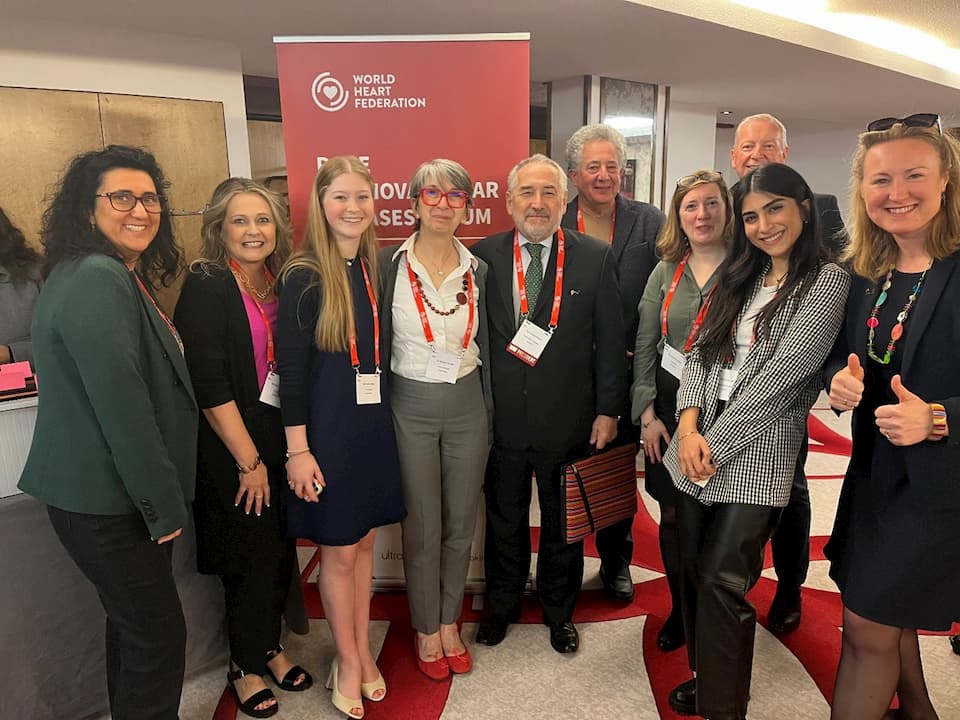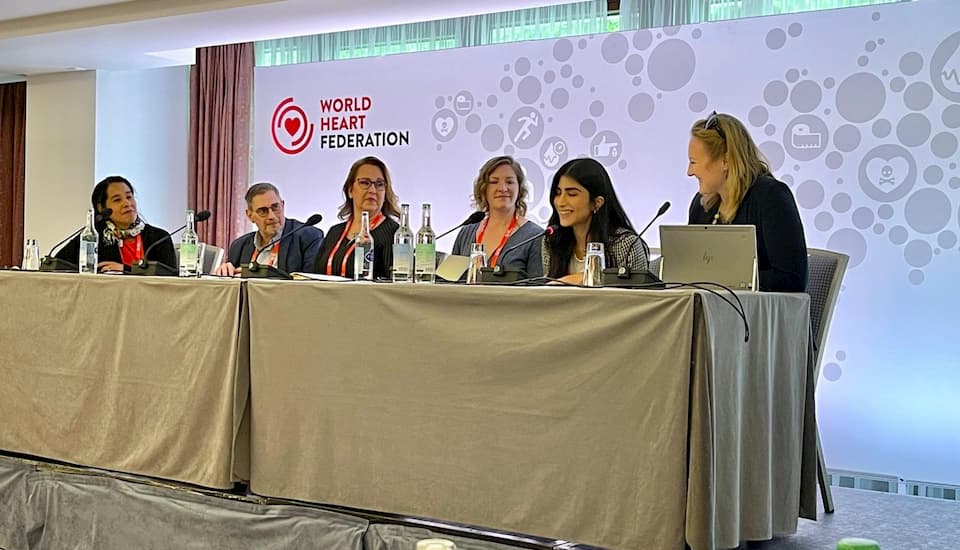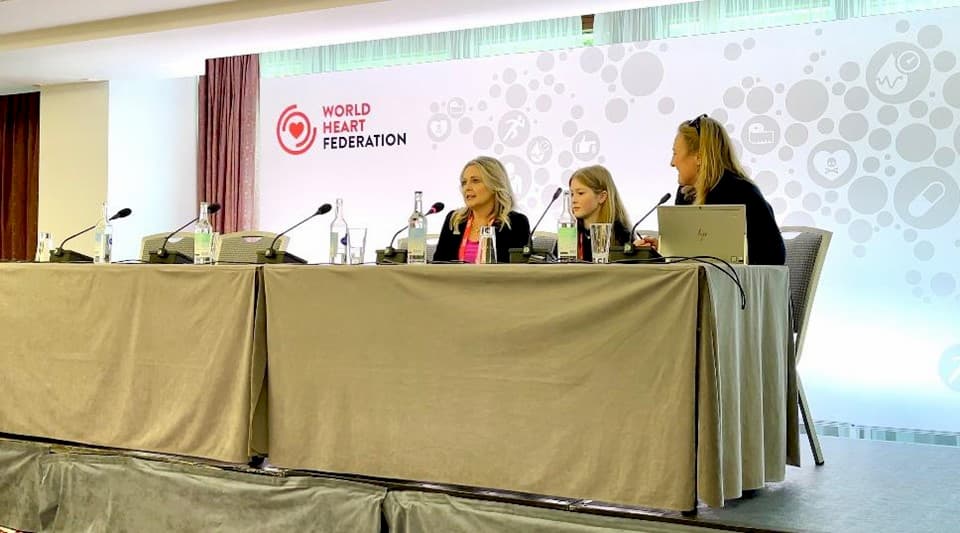International HoFH community advocates at the WHF Rare CVDs Forum
An international community of multidisciplinary stakeholders committed to making lives of people with rare cardiovascular diseases “longer and better” came together at the Rare Cardiovascular Diseases Forum (CVDs). FH Europe together with the HoFH community was actively involved in the meeting’s design and preparation as well as delivery onsite.
The meeting was held on 17th and 18th May, in Geneva, Switzerland, immediately prior to the World Heart Summit. Both events organized by the World Heart Federation (WHF). The goal for the Forum was to provide a platform to discuss the challenges to reducing the burden and mortality of rare CVDs, and ways in which these challenges can be addressed.
The desired outcome of the meeting was to allow the development of priorities for action and possible strategies under which World Heart Federation and its partners could develop a workplan to address challenges to rare CVDs care.
With the contributions of experts from the wider rare diseases community jointly with patient experts, clinicians and scientists from four specific rare CVDs, the event offered a deep dive into Homozygous FH (HoFH), Pulmonary Arterial Hypertension (PAH), Hereditary Hypertrophic Cardiomyopathy (HHC) and ARRT-CM. Across a number of plenary sessions and disease specific breakout room sessions, the participants discussed challenges that are faced across the globe regarding rare CVDs awareness, diagnosis, and access to treatments. Yet, what made the meeting powerful, were the patients’, caregivers’ and patient advocates’ testimonies, homing in on issues related to mental health, psychological impact, stigma, discrimination and inequalities (sex, age, geography, etc.).
The meeting was opened by Prof. Daniel José Piñeiro, President of World Heart Federation stating that ‘health is a human right’ under the UN Convention on Human Rights, which set the context for the discussions. The event’s proceedings were chaired by Prof. Thomas Gaziano, Chair of the WHF Scientific Committee.
In her keynote speech, Dr Durhane Wong-Rieger, Chair of Rare Diseases International and President and CEO of the Canadian Organization for Rare Disorders, while sharing her personal experience of a rare CVD affecting her family member, set the scene by identifying some of the many challenges experienced by individuals and families across all rare diseases.
The unmet needs, challenges as well as hopes and opportunities of the HoFH patients’ community were well represented by a group of FH Europe Patient Ambassadors, advocates, medical practitioners, scientists and researchers in the field.

Excited to come together, finally in person, at the WHF Rare CVDs Forum in Geneva, 2023. From the left: Prof Mafalda Bourbon, Michelle and Avery Watts, Prof, Marina Cuchel, Prof. Prof. Daniel José Piñeiro, Dr Sam Gidding (behind), Grainne Crowley, Ken O’Reilly (behind), Chyrel Lichaa, Magdalena Daccord.
First dedicated session, zooming in on key challenges and current policy recommendations in HoFH, was delivered by Dr Marina Cuchel, from the University of Pennsylvania. Dr Cuchel, also involved in the HoFH International Clinical Collaboration (HICC), the international HoFH registry, referred to the recent publication of the 2023 Update on European Atherosclerosis Society Consensus Statement on Homozygous Familial Hypercholesterolaemia: new treatments and clinical guidance.
Prof. Mafalda Bourbon, from the National Institute of Health in Portugal, and an advisor in the Public Health Advisory Committee at FH Europe and Chair of the Familial Hypercholesterolaemia Variant Curation Expert Panel at Clinical Genome Resource, took a closer look at access to care, screening and regulation in the context of rare diseases. She addressed the issue of genetic testing for rare CVDs. She then shared about a high throughout genotyping/low-cost array, which was being developed at her lab. The array is intended to have all FH associated variants in ClinVar worldwide and is expected to identify >90% of the FH cases.
For genetic screening to be useful she recommended that more education in genetic and genomics so that informed decisions can be made about genetic testing when it is necessary. More genetic and genomic counsellors to would be needed inform and guide patients and their families. There is a need for patients to be more involved in research design so they can better guide researchers towards what is more important for them, and she predicted that with the eventual identification of the correct aetiology of each disease will allow for a more personalised treatment approach.
The session was then followed by a case study presentation on improving screening and testing for rare CVDs by Prof. Lale Tokgözoğlu from Hacettepe University in Turkey. In her online presentation, Prof. Tokgözoğlu presented the biggest achievements of the Turkish National FH programme, like the creation of an FH registry and patient organization. But she did not shy away from naming some of the persistent challenges related to awareness raising, implementation, reimbursement and lack of a universal screening programme. She then advocated for a greater collaboration with patients in overcoming some of the barriers in screening and testing strategies.

From the left: Diana McGhie, Chair of the WHF Advocacy Committee, Keith Dares, ATTR-CM patient advocate, from Canada, Lisa Salberg, Hypertrophic Cardiomyopathy patient advocate and Lauren Janzen, PAH patient advocate, both from the USA, Chyrel Lichaa, HoFH patient advocate from Lebanon, and Magdalena Daccord, Chief Executive of FH Europe.
The social and psychological impact of living with rare CVDs was addressed in a powerful panel session co-chaired by Diana McGhie, the American Heart Association’s Global Advocacy Portfolio Lead and the WHF’s Board Member, and Magdalena Daccord, FH Europe’s Chief Executive. The participants heard from patient advocates, each living with one of the four rate CVDs.
Chyrel, FH Europe’s HoFH Patient Ambassador, represented a voice of patients from the Middle East. She shared her experience of dealing with societal attitudes as a woman with a rare genetic disease, and the difficulties she has accessing already limited treatment options in Lebanon, particularly after the explosion in Beirut in 2020. She said of her experience “Being a patient ambassador is an honor that comes with immense responsibility. My presence at the WHF Rare CVDs Forum is a reminder that patient voices matter and that our stories have the power to create meaningful change. It is an opportunity to amplify the call for awareness and action and I am deeply humbled to have been entrusted with this task”.
Michelle Watts, tireless ‘Averys Fight’ campaigner for all those with HoFH. spoke alongside Avery, her daughter, who at 14 was making her first public appearance as an HoFH patient advocate. Initially shy but very brave, she was adamant about coming onto stage in person, despite being the youngest participant of the Forum. She demonstrated to all those in the room, both how invisible HoFH and its impact can be, and what disruption the condition can cause to the life of a child who, in her case, has already needed three open-heart surgeries and had a heart attack at only 11. Afterwards Michelle said “As the mother of a rare CVD patient, I know first-hand how difficult it can be to access needed healthcare. Hearing the stories of other patients’ struggles and the hurdles they have had in accessing healthcare has further engrained my resolution to raise awareness and advocate for those who don’t have a voice.” Michelle and Avery, although based in the USA, have been actively involved in advocacy and awareness campaigns with FH Europe as Ambassadors since 2020.

A powerful and emotional interview with Avery Watts, a young HoFH Patient advocate from the USA, and her mom Michelle, conducted by Magdalena Daccord. From the left: Michelle and Avery Watts, Magdalena Daccord.
The Forum covered strategies for improving healthcare for all. Matt Bolz-Johnson from EURORDIS presented European Reference Network (ERNs). ERNs are virtual networks involving healthcare providers across Europe. They aim to facilitate discussion on complex or rare diseases and conditions that require highly specialised treatment, and concentrated knowledge and resources.
Regulatory issues and clinical trials for rare diseases was discussed by Heidi Ross from NORD (https://rarediseases.org). Rare disease trials are notorious for being ‘data scarce’, so NORD is making efforts to improve patient engagement in clinical trials including empowering patients to be true partners in the drug development process. The importance of good disease registries was emphasised which would enable research question(s) to be identified and might possibly, in time, serve as a control group for clinical trials.
Dr Sam Gidding, FH Europe’s Trustee and Chair of the Scientific Advisory Committee, opened the second day of the Forum with a summary of Day 1. He then concluded by saying “With regard to rare diseases we learned that physicians and scientists possess critical information and knowledge, while patients often possess the wisdom”. Jill Prawer, the Rare Disease Project Manager at FH Europe, in her role as rapporteur for the break-out sessions on HoFH, provided a summary of 2 sessions which discussed better diagnosis and access to care for people with HoFH and how to attain equitable access for all.
The meeting was closed by the WHF’s Presidents – present, past and the vice president, all committing to a greater patient engagement and patient centricity in the future activities of the World Heart Federation.
FH Europe is supported by an educational grant from Amgen Limited, Sanofi, Regeneron, Akcea Therapeutics Inc. and Amryt
Site by: Vovi Web Design

